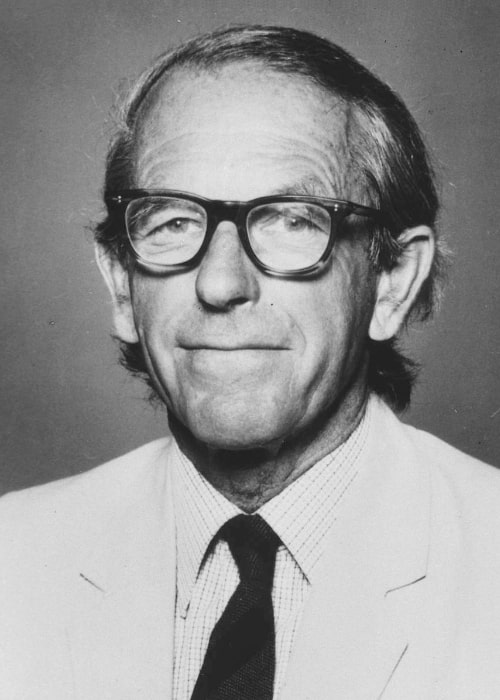| Frederick Sanger Quick Info | |
|---|---|
| Height | 5 ft 9 in |
| Weight | 66 kg |
| Date of Birth | August 13, 1918 |
| Zodiac Sign | Leo |
| Date of Death | November 19, 2013 |
Frederick Sanger was a British biochemist who received the Nobel Prize in Chemistry twice, first in 1958 and then in 1980 (along with Walter Gilbert and Paul Berg). With this, he became one of the three people to have won multiple Nobel Prizes in the same category (the others being John Bardeen in physics and Karl Barry Sharpless in chemistry).
Born Name
Frederick Sanger
Nick Name
Frederick

Age
He was born on August 13, 1918.
Died
On November 19, 2013, Frederick Sanger died in his sleep at the age of 95 at Addenbrooke’s Hospital in Cambridge, Cambridgeshire, England, United Kingdom.
Sun Sign
Leo
Born Place
Rendcomb, Gloucestershire, England, United Kingdom
Residence
He lived in his home “Far Leys” in Swaffham Bulbeck outside Cambridge in England, United Kingdom.
Nationality
Education
Frederick Sanger studied at the Downs Malvern, a private prep school located in the United Kingdom. When he was 14 years old, he joined the recently established Bryanston School in Dorset in 1932. He ended up completing his School Certificate a year early and spent most of his last year of school experimenting in the laboratory alongside his chemistry teacher Geoffrey Ordish.
Sanger attended Schule Schloss Salem in southern Germany in 1935 as an exchange student. He then enrolled at St John’s College in Cambridge in 1936 and studied natural sciences. He took courses in physics, chemistry, biochemistry, and mathematics for Part I of his Tripos but struggled with physics and mathematics. He graduated in December 1940.
In October 1940, he began studying for a PhD under N.W. “Bill” Pirie. His thesis was titled “The metabolism of the amino acid lysine in the animal body” and was awarded his doctorate in 1943.
Occupation
Biochemist
Family
- Father – Frederick Sanger (General Practitioner)
- Mother – Cicely Sanger (née Crewdson)
- Siblings – Theodore (1-year Older Brother), May (Mary) (5-year Younger Sister)
Build
Slim
Height
5 ft 9 in or 175 cm
Weight
66 kg or 145.5 lbs
Girlfriend / Spouse
Frederick Sanger dated –
- Margaret Joan Howe (1940-2012) – He got married to Margaret Joan Howe in the year 1940 and they were blessed with 3 children – two sons named Robin (b. 1943) and Peter (b. 1946) and a daughter named Sally Joan (b. 1960). The duo remained together until her death in 2012 and he stated that his wife had “contributed more to his work than anyone else by providing a peaceful and happy home.”
Race / Ethnicity
White
Hair Color
Salt and Pepper
Eye Color
Dark Brown
Sexual Orientation
Straight
Distinctive Features
Thin lips
Religion
He was raised as a Quaker.
He later said that he found no evidence for a God so he became an agnostic. In an interview published in the Times newspaper in 2000, Sanger said: “My father was a committed Quaker and I was brought up as a Quaker, and for them truth is very important. I drifted away from those beliefs – one is obviously looking for truth, but one needs some evidence for it. Even if I wanted to believe in God I would find it very difficult. I would need to see proof.”
Frederick Sanger Facts
- During his first two years at Cambridge, he lost both his parents to cancer.
- During World War II, he was granted unconditional exemption from military service as a conscientious objector.
- In 1979, Frederick Sanger received the Albert Lasker Award for Basic Medical Research and won the Louisa Gross Horwitz Prize of Columbia University.
- At the age of 65, he retired in 1983.
- He became one of the signatories of the agreement to convene a convention for drafting a world constitution.
- He declined knighthood as he did not wish to be addressed as “Sir” and said, “A knighthood makes you different, doesn’t it, and I don’t want to be different.”
- In 2000, Sanger received the Golden Plate Award from the American Academy of Achievement.
- The Wellcome Trust Sanger Institute (formerly known as The Sanger Centre and Wellcome Trust Sanger Institute) has been named in his honor.
Featured Image by National Institutes of Health (part of the United States Department of Health and Human Services / U.S. Federal Government / Public Domain
